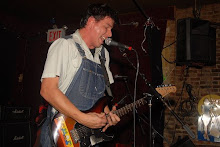There were several items which needed to be addressed:
Several bars were missing from the end of the Finale. [the uploader] had already done a repair to missing bars in the Scherzo,
but he had material to work with within the existing file; in the
finale, there wasn't anything that could be used. Fortunately, for
many years now, I have had a cassette with the only last ten minutes
of the same performance; it sounded just as bad but it had the missing
bars.
A patch job could be done!
The entry of the Scherzo was noisy and abrupt, distorted and
truncated. Some careful and exacting digital editing was needed to
extract enough clean signal to reconstruct just that one first note.
Generally, noise and hum was reduced though not eliminated.
Transitions from silence to movement entries were refined.
There were some loud, bass-heavy THUMPS which sounded like somebody
bumped the microphone during the recording, which Jascha Horenstein's
cousin alleges was made using a microphone in front of a radio
loudspeaker. These THUMPS couldn't be made inaudible; all that could
be done was to filter out the heavy bass.
Gross digital clipping in the loudest segments of all movements had
to be addressed. The overall level was dropped to provide some
headroom, and software was applied to attempt a restoration of the
clipped portions. The results of this procedure are seldom 100%
effective, but they are audible here. Unfortunately some of the
distortion from the digital clipping remains; and there was nothing
that could be done for distortion from analog tape overload, without
severely filtering the treble unacceptably.
If one carefully listens to the original, it sounds like Horenstein
played the fourth movement and the Finale without a pause. But I
couldn't tell if this was a poor edit, long ago, on a previous
generation of the tape. I know someone who was there in Edinburgh at
the concert and he says that there was a definite pause, but a short
one. However, Jascha Horenstein's cousin says that his notes from
other Horenstein performances of Mahler 5 say that the conductor
played through the IV-V transition without a pause. I've retained
the split of the two movements onto separate tracks but have put a
minimal amount of silence after the hall echo at the end of IV, and a
minimal amount before the entry of V. If played consecutively, this
makes the pause very short. For those who prefer a longer silence
between the movements, there is always the PAUSE control.
When played, the original was pitched quite too high: a semitone.
That error is a lot, even for a cheap cassette deck; but I have seen
some that had that degree of speed error. Under the assumption that
the pitch error occurred in the analog domain, this means that the
original also was playing too fast! The semitone down-transposition
and accompanying 5.6% slowdown altered the portrayal of the entire
symphony; compared to known, good-sounding Horenstein performances of
the Mahler Sixth Symphony, this Fifth originally sounded too
"lightweight."
After the pitch/speed correction, the gentleman who actually heard
the concert in Edinburgh said, "it does darken the performance and is
much closer to what I remember at the Usher Hall in Edinburgh."
The result is not perfect; it's no silk purse but it is no longer a
sow's ear, either. Some distorted patches remain, and there are
pitch bobbles that sound like irregularity in reel-to-reel tape feed.
I still hope a better copy turns up that will allow this performance
to shine for all it's worth. Jascha Horenstein's cousin is still
trying to search one out, and we should all hope that he is
successful; but for now, this is what we have.
The downloadable files include an excerpt from the introductory
comments on the 1961 broadcast. The audience's applause with
broadcast exit comments follow the Finale, as in the original
broadcast.
























